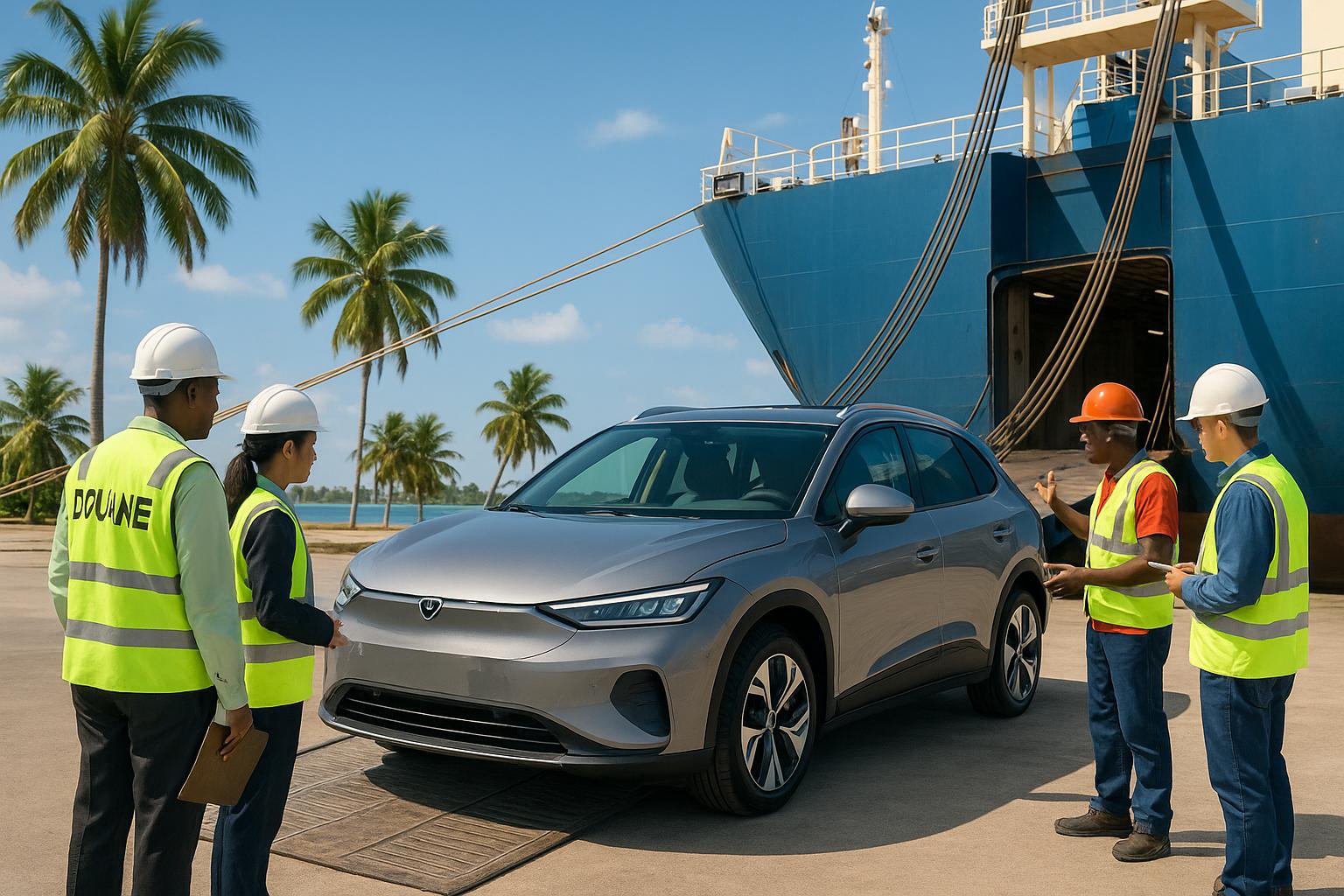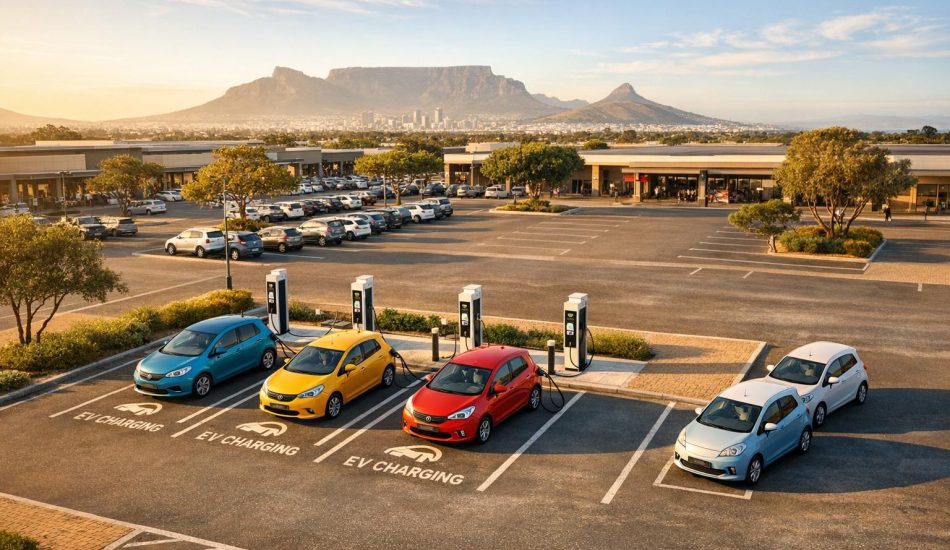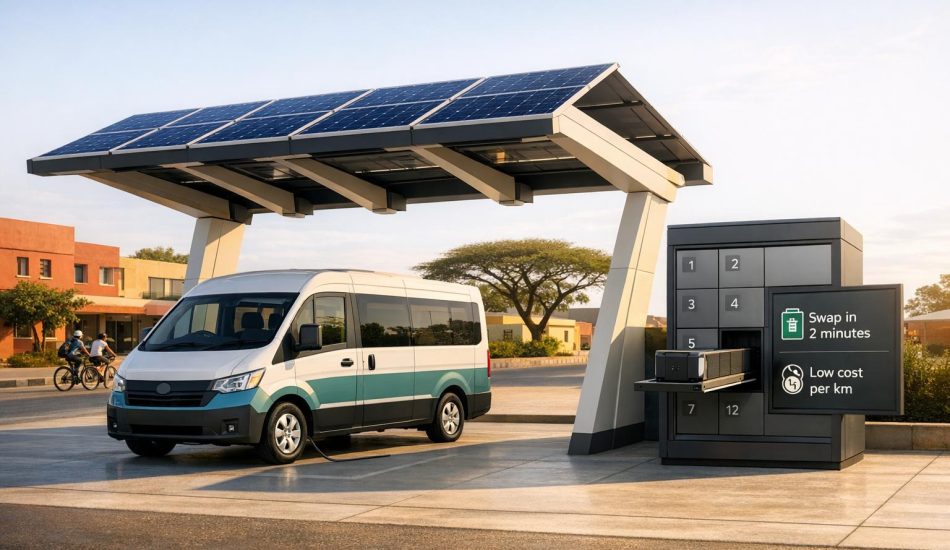
Importing electric vehicles (EVs) into Cameroon in 2025 has become a cost-saving opportunity thanks to government incentives. Here’s what you need to know:
- Tax Savings: New EVs are exempt from the 12.5% excise duty and enjoy a 50% reduction in taxable value for 24 months. Used EVs, however, do not qualify for this rebate.
- Costs: Import expenses for EVs, including freight, insurance, and duties, range from $2,800 to $4,500. VAT for both new and used EVs is 19.25%.
- Documents: Key paperwork includes a Certificate of Conformity (CoC), BESC/ECTN certificate, and customs clearance documents.
- Shipping: Roll-on/roll-off shipping is cost-effective, with delivery from Europe or China taking 20–45 days.
- Regulations: Only left-hand drive vehicles are permitted, and pre-shipment inspections by SGS are mandatory.
With reduced taxes, lower operating costs, and government support for charging infrastructure, EVs are now a more affordable and practical choice for importers in Cameroon. Act during the 24-month incentive period to maximize savings.
Cameroon EV Import Tariffs and Tax Breaks for 2025
Cameroon’s 2025 tariff structure introduces significant tax breaks, making it much cheaper to import electric vehicles (EVs) than traditional gasoline-powered cars. These changes reflect the government’s push to promote cleaner transportation options.
Tariff Rates for New and Used EVs
Starting January 1, 2025, electric vehicles will no longer be subject to excise duties, which were previously set at 12.5%. This exemption applies across the board, immediately reducing costs for EV importers.
However, there’s a new cost for those importing used vehicles. Beginning July 1, 2025, Cameroon will implement an "Import Verification Tax" on all used vehicles entering the country. This tax is set at CFA 29,813 (approximately $48) per vehicle, including VAT, and covers verification and identification checks. Additionally, used EVs will still be subject to the standard 19.25% VAT based on their value.
| Vehicle Type | Excise Duty | Import Verification Tax | VAT Rate | Incentives |
|---|---|---|---|---|
| New EVs | 0% (exempt) | Not applicable | Standard rate | 50% taxable value reduction |
| Used EVs | 0% (exempt) | CFA 29,813 (~$48) | 19.25% | 50% taxable value reduction |
| Traditional vehicles | Up to 200% | CFA 29,813 (~$48) for used | 19.25% | None |
For gasoline and diesel vehicles, import taxes can climb as high as 200%, making EVs a much more affordable option for importers.
In addition to the tariff exemptions, government incentives further reduce the cost of bringing EVs into Cameroon.
50% Tax Rebates and Government Incentives
The most notable benefit for EV importers is the 50% reduction in taxable value for imported electric vehicles, motorcycles, batteries, and charging stations. This incentive is available for a 24-month period, starting from January 1, 2025, giving importers a clear window to maximize savings.
The 2025 Finance Bill also includes an exemption from road tax for all-electric vehicles and offers subsidies for EV charging infrastructure. These measures are part of a broader government initiative aimed at boosting the adoption of electric mobility in Cameroon.
Industry leaders have welcomed these changes:
"This will help maintain the state’s purchasing power, make it easier for Cameroonian consumers with low incomes to access new vehicles, and improve road safety." – Patrocle Petridis, Managing Director of TotalEnergies Marketing Cameroon
These tax breaks align with Cameroon’s environmental goals. By reducing taxes on EVs – seen as "clean" vehicles – the government hopes to encourage their adoption while discouraging reliance on more polluting gasoline and diesel vehicles. This effort supports the fight against pollution in the country’s transport sector.
The initiative also reflects collaboration between the government and private sector. In 2023, car dealership 3S Motors and French energy company TotalEnergies formed the Cameroon Electric Mobility Promotion Association (Apeme-Cam) to prepare the country’s roads for electric vehicles starting in 2025. This partnership underscores Cameroon’s serious commitment to EV adoption.
For importers, the combination of excise duty exemptions and a 50% reduction in taxable value offers substantial savings. When compared to the steep import taxes of up to 200% on traditional vehicles, these incentives make EVs a smart financial choice for businesses and individual buyers alike.
How to Import Electric Vehicles: Step-by-Step Process
Bringing an electric vehicle (EV) into Cameroon involves navigating a detailed process that includes managing logistics, gathering the right documentation, and adhering to local regulations. While it may seem complex, understanding the steps can help you avoid unnecessary delays and ensure a smoother experience.
Required Documents for EV Imports
Before your EV reaches Cameroon’s ports, you’ll need to have all your paperwork in order. One of the most important documents is the Attestation of Verification to Import (AVI), which must be requested from SGS, the Swiss company overseeing inspections at Cameroon’s ports. This request must be submitted by the time the shipping manifest is validated.
Here’s what you’ll need to prepare:
- AVI request to SGS
- An interpretative document
- Bill of lading or air waybill
- Final invoice
- Packing list
- Local insurance certificate
- Customs clearance documents
- Cargo manifest
- Exemption vouchers and phytosanitary certificate (if applicable)
For roll-on/roll-off (RORO) vehicles, you’ll also need FIMEX registration or a Special Import Authorization, along with the Cameroon ECTN.
It’s a good idea to start gathering these documents at least two weeks before shipping to avoid last-minute issues. Double-check everything before submission to steer clear of delays.
Import Process Steps
Once your documents are submitted, the process moves forward with inspections and clearances.
- After document approval, SGS will issue the AVI within eight hours.
- At the port, an inspector will verify the vehicle and provide three stamped copies (grey, blue, and yellow).
- Upon payment through your bank and SGS, the blue copy along with the payment receipt will confirm clearance and allow the release of your vehicle.
This system, with its multiple stamped copies, ensures a clear audit trail for the entire process.
Shipping by sea is the most budget-friendly option, typically taking 25–45 days from China to Douala Port. However, Douala Port often faces challenges like congestion, slow unloading, and theft risks. To avoid peak congestion, steer clear of December shipments when delays are especially common.
The total cost to import an EV generally ranges from $2,800 to $4,500, depending on the vehicle’s value. This includes:
- Ocean freight: $1,500–$2,800
- Insurance: 1.5% of the vehicle’s value
- Cameroon duties: 10–30%
- VAT: 19.25%
Government Agencies You’ll Work With
You’ll interact with several key agencies during the import process. The Cameroon National Shippers’ Council (CNSC) handles the ECTN process, while Customs oversees duties and VAT verification. Familiarity with these agencies can help you navigate the system more efficiently.
It’s also worth noting that only left-hand drive vehicles are permitted in Cameroon. Make sure your EV meets this requirement before shipping. To minimize theft risks and customs complications, consider shipping spare parts separately.
Government Approvals and Safety Requirements
Navigating government certifications is essential to avoid delays or penalties when importing electric vehicles (EVs).
Required Approvals for EV Imports
One of the most crucial documents for EV imports is the Certificate of Conformity (CoC), which is mandatory for customs clearance. Without this certificate, your vehicle may be seized, and penalties could follow. This requirement falls under Cameroon’s Pre-Shipment Evaluation of Conformity (PECAE) program, established by Prime Ministerial Decree No. 2019/143. The program mandates inspections for nearly all imports entering the country.
"All goods imported into the Republic of Cameroon, with the exception of those listed in Article 8 of Decree Number 2015/1875/PM of July 1, 2015, which established the pre-shipment conformity assessment program (PECAE), must undergo assessment prior to shipment by the assessment body mandated by the State of Cameroon, namely SGS."
The SGS is the sole authority authorized to conduct these inspections and issue the CoC. Before shipping your EV to Cameroon, you must arrange for an inspection by SGS. Inspection fees typically range from 0.5% to 1% of the vehicle’s FOB value. For instance, if your EV costs $25,000, inspection fees will be between $125 and $250.
Additionally, you’ll need the BESC/ECTN (electronic cargo tracking number) certificate. Without it, your vehicle will not be allowed entry at Douala Port. This certificate must be secured before shipping and included with your documentation.
If you’re using roll-on/roll-off (RORO) shipping, you’ll also need proof of registration in the Importers/Exporters File (FIMEX) or a valid Special Import Authorization.
Once these certifications are obtained, they are reviewed to ensure compliance with Cameroon’s safety and environmental standards.
Safety and Environmental Standards
Imported EVs must meet Cameroon’s safety and environmental standards, verified through a technical vehicle inspection conducted by SGS. This inspection ensures that all essential safety and environmental components meet the required regulations.
"The visit technique has the objective of verifying the conformity of all the essential components of the vehicle related to safety and the environment." – ELITIS CAMEROUN
The inspection includes checks on emission control, noise levels, and visual impact as outlined by Cameroon’s environmental standards. Even though EVs don’t produce direct exhaust emissions, they are still subject to these checks to ensure the integrity of systems like brakes, lighting, and overall structural and electrical safety. This inspection complements the earlier technical review required for AVI clearance.
The Agency for Standards and Quality (ANOR) oversees these conformity checks, working closely with SGS to ensure all imported vehicles align with national technical standards. These rigorous standards reflect Cameroon’s commitment to cleaner transportation, aiming to reduce urban emissions, noise pollution, and other nuisances.
Import Documentation Checklist
After meeting all approval and safety requirements, ensure your documentation is complete:
Pre-Shipment Requirements:
- Certificate of Conformity (CoC) issued by SGS
- BESC/ECTN certificate for cargo tracking
- FIMEX registration or Special Import Authorization (for RORO vehicles)
Safety and Environmental Compliance:
- Technical vehicle inspection report from SGS confirming compliance with safety and environmental standards
Submit all documents by the shipping manifest validation deadline to avoid delays. The CoC must accompany your customs declaration – without it, customs clearance will be denied, even if other documents are in order.
Keep multiple copies of all certificates and approvals, as various government agencies may request them during different stages of the import process. Staying organized and having these documents on hand will help streamline the approval process for your EV import.
sbb-itb-99e19e3
Money-Saving Tips for EV Importers
Bringing in electric vehicles (EVs) can be expensive, but smart planning and informed decisions can help you cut costs significantly. With traditional vehicle import taxes sometimes hitting a staggering 200% in some regions, knowing how to save is essential for a smooth and cost-effective import process.
How to Reduce Import Costs
Take advantage of Cameroon’s 50% tax rebate on newly imported electric vehicles, motorcycles, batteries, and charging stations. This rebate is available for the next 24 months, but keep in mind that it does not apply to used vehicles. For instance, if you’re importing a US$30,000 EV, this rebate could save you as much as US$3,750 on excise duty alone.
You can also benefit from free-trade agreements like the Cameroon-EU EPA and the AfCFTA, which may reduce tariffs depending on your EV’s country of origin. These agreements could lead to even more savings, so it’s worth investigating their terms.
To avoid unexpected costs, conduct all transactions in US dollars to sidestep currency conversion issues. Additionally, finding reliable suppliers is key to keeping your import costs manageable.
Finding Trusted Suppliers and Platforms
Working with trustworthy suppliers is critical to avoiding fraud and costly mistakes. Look for partners with a solid history of successful international exports, particularly those familiar with African markets. Suppliers with official certifications and strong testimonials from past clients are more likely to deliver reliable service.
Platforms like EV24.africa make it easier to find dependable EV suppliers. They offer a variety of new and used electric vehicles from top brands such as Tesla, BYD, Leapmotor, ROX, Dongfeng, Geely, Hyundai, Toyota, and Suzuki. With transparent pricing, financing options, and delivery services across Africa – including Cameroon – they simplify the import process.
When vetting suppliers, confirm they have the necessary licenses and registrations. Request documentation like VAT certificates and ISO certifications to verify their legitimacy. For added security, use payment methods such as escrow accounts or letters of credit. If sourcing from Chinese manufacturers – who dominate the EV market – ensure they meet international compliance standards.
"A reliable EV parts supplier surpasses merely delivering parts. They offer comprehensive support, including engineering design services, manufacturing reviews, and a dedication to your success." – MES Inc.
Working with reputable suppliers not only reduces financial risks but also simplifies customs procedures. Ensure they provide complete shipping and customs documentation, such as vehicle identification numbers (VIN), production reports, and inspection certificates, before you make a purchase. For extra peace of mind, consider hiring a third-party inspection service to check the vehicles before they are shipped.
Documentation and Customs Tips
Once you’ve secured competitive pricing and reliable suppliers, focus on getting your documentation in order. Keep both digital and physical copies of all essential documents to ensure a smooth review process with customs agencies. Proper documentation can save you time, money, and unnecessary headaches during the import process.
2025 EV Market Changes and New Policies
Cameroon’s electric vehicle (EV) market is set for a major shake-up in 2025, driven by new government initiatives and evolving market trends. These developments are opening up fresh opportunities for importers and redefining the country’s vehicle landscape.
Government Programs to Accelerate EV Adoption
In a bold move to promote EVs, the Cameroonian government has introduced policies aimed at making electric vehicles more accessible. One of the most notable changes is the removal of the 12.5% excise duty on EVs under the 2025 Finance Bill.
Additionally, for the next 24 months, importers of electric vehicles, motorcycles, batteries, and charging stations can take advantage of a 50% tax rebate. This rebate applies to the taxable value of imports. For instance, an EV valued at $30,000 would see considerable savings thanks to this policy shift.
Infrastructure is also being addressed. Cameroon currently has just three charging stations – two in Douala and one in Yaoundé – but the government plans to subsidize the development of new stations nationwide. This expansion is critical for supporting the growing EV market.
Local businesses are already benefiting from these changes. Spiro, a company operating electric motorcycles, has achieved operating costs of only 1,500 CFA francs ($2.50) per 100 km. As Rahul Gaur, Spiro’s Managing Director for West Africa and Cameroon, explains:
"Our goal is to make electric mobility affordable… At 1,500 CFA francs (US$2.50) per 100 km, operating costs are significantly lower than petrol bikes."
Another example of local innovation is Lucien Michel Fezeu’s “Babana 237” electric bike, priced at 500,000 CFA francs ($830). This demonstrates how new policies are encouraging homegrown solutions in the EV space.
However, the benefits are primarily geared toward new EV imports, with different rules coming into play for used vehicles.
Changes to Used Vehicle Import Taxes in July 2025
Starting in July 2025, new policies will make a clear distinction between new and used EV imports. Unlike new EVs, used electric vehicles will not qualify for the 50% tax rebate. This makes importing new EVs a far more cost-effective option.
The government’s aim with this policy is twofold: to improve road safety and to encourage the use of higher-quality vehicles. By making new EVs more affordable, the government hopes to make them accessible to a broader range of consumers while phasing out older, less reliable vehicles.
Given that second-hand vehicles make up about 85% of Africa’s automotive inventory, the shift in policy is significant. Importers now have the chance to bring in affordable EVs from China at even lower costs, thanks to reduced import duties. On top of that, operating an EV in Cameroon is estimated to be at least 50% cheaper than running a fuel-powered car, with maintenance costs projected to be 30% lower over the vehicle’s lifespan.
Growing Demand and Supply for EVs
The market for EVs in Cameroon is growing, driven by their cost advantages and environmental benefits. With gasoline prices averaging 828 CFA per liter, compared to electricity costs of 50–99 CFA plus VAT per kWh, the financial case for EVs is strong.
China has become the leading supplier for Cameroon’s EV market, offering a wide range of models at competitive prices. Combined with tax incentives, advancements in battery technology, and improved charging infrastructure, EVs are becoming more practical for everyday use. This has attracted increasing interest from both local and international investors.
Platforms like EV24.africa are also playing a role, connecting importers with trusted suppliers for major EV brands.
The transport sector’s energy consumption highlights the potential impact of this transition. In 2018, transportation accounted for 15% of Sub-Saharan Africa’s total energy consumption. With government backing, better economics, and an improving supply chain, Cameroon is poised for a breakthrough year in EV adoption in 2025. This combination of factors is creating a fertile ground for electric vehicle imports and a cleaner, more efficient transportation future.
Summary: Your EV Import Checklist for Cameroon 2025
Bringing an electric vehicle (EV) into Cameroon in 2025 could be a smart financial move. To make the process smooth and cost-effective, it’s crucial to understand the requirements and leverage the available incentives. Here’s a breakdown of what you need to know.
Big Savings on Taxes
New EVs come with some serious perks. They enjoy a 50% reduction in taxable value for 24 months and are exempt from the 12.5% excise duty. Compare that to traditional vehicles, which can face import taxes as high as 200%. Keep in mind, though, these benefits are strictly for brand-new EVs.
Get Your Paperwork in Order
Proper documentation is non-negotiable for a successful import. You’ll need the Bordereau Électronique de Suivi des Cargaisons (BESC), which costs $275 per vehicle and is mandatory for all shipments to Cameroon. Other essential documents include:
- Vehicle registration and title
- Proof of ownership
- Bill of sale
- Identification documents
For updates and further assistance, check out the Ministry of Finance’s website (www.minfi.gov.cm) or the Directorate General of Customs at www.douanes.cm. Alternatively, you can visit the IT Division of the Directorate General of Customs in Douala at Door No. 27 in Bonanjo.
Shipping Tips to Cut Costs
If you’re shipping an operational EV, Roll-On/Roll-Off (RORO) transport is the way to go. It’s cost-effective, with rates ranging from $1,142 to $1,672 from Germany and $1,192 to $1,692 from the Netherlands. The Rotterdam-to-Douala route is particularly efficient, offering delivery in just 20 days. To avoid delays at customs, ensure the vehicle’s undercarriage is clean and free of foreign soil.
Budgeting for the Full Import Cost
Here’s what to include in your calculations:
- 10% import duty
- 12.5% VAT
- Import Verification Tax for used vehicles, set at 29,813 CFA francs (about $50)
Thanks to the new incentives, importing an EV is now far more affordable than bringing in a traditional vehicle.
Consider the Long-Term Benefits
EVs are not just cheaper to import – they’re also easier on your wallet over time. They cost up to 50% less to operate and require 30% lower maintenance expenses. While Cameroon currently has only three charging stations (two in Douala, one in Yaoundé), the 2025 Finance Bill includes a subsidy to expand charging infrastructure.
Patrocle Petridis, Managing Director of TotalEnergies Marketing Cameroon, emphasizes:
"This will help maintain the state’s purchasing power, make it easier for Cameroonian consumers with low incomes to access new vehicles, and improve road safety."
Your Next Steps
- Get quotes from reputable international shipping companies.
- Ensure all your documents are prepared accurately and well in advance.
- Act promptly to take full advantage of the 24-month incentive window.
With these steps, you’ll be well on your way to enjoying the benefits of electric mobility in Cameroon.
FAQs
What are the steps and required documents for importing a new electric vehicle into Cameroon in 2025?
To bring a new electric vehicle into Cameroon in 2025, you’ll need to start by organizing all the required documents at least two weeks before shipping. These include proof of purchase, vehicle registration papers, and compliance certificates. Double-check that everything is accurate and complete to avoid any unnecessary delays.
The process involves customs clearance, which comes with some perks for electric vehicles – like exemptions from excise duties and a 50% tax rebate. To make things easier, consider working with a Cameroon-based agent who can help navigate the process. The key regulatory authorities you’ll deal with are Cameroon Customs and the Ministry of Trade. Careful planning and thorough documentation will go a long way in ensuring a smooth import process.
What tax incentives are available for electric vehicles in Cameroon compared to traditional gasoline cars?
Cameroon is rolling out generous tax breaks to promote the use of electric vehicles (EVs). Starting in 2025, EVs, electric motorcycles, batteries, and charging stations will benefit from a 50% cut in import duties and a 50% reduction in taxable value. These incentives aim to make EV adoption more appealing and affordable.
On the other hand, traditional gasoline vehicles are subject to a 12.5% excise duty and higher import tariffs, with no tax relief or exemptions. This policy shift positions EVs as a more budget-friendly and environmentally conscious option for both importers and buyers in the country.
What safety and environmental standards should electric vehicles meet before being imported into Cameroon?
Importers need to confirm that electric vehicles meet international safety standards, including UN 38.3, which focuses on battery safety during transportation. On top of that, the vehicles must comply with Cameroon’s emission regulations, aimed at reducing environmental impact and aligning with global efforts to protect the planet.
Before moving forward with importing, it’s essential to double-check that the EV meets these standards. This step can help prevent delays or penalties during the approval process, ensuring a more seamless import experience while contributing to Cameroon’s environmental goals.




